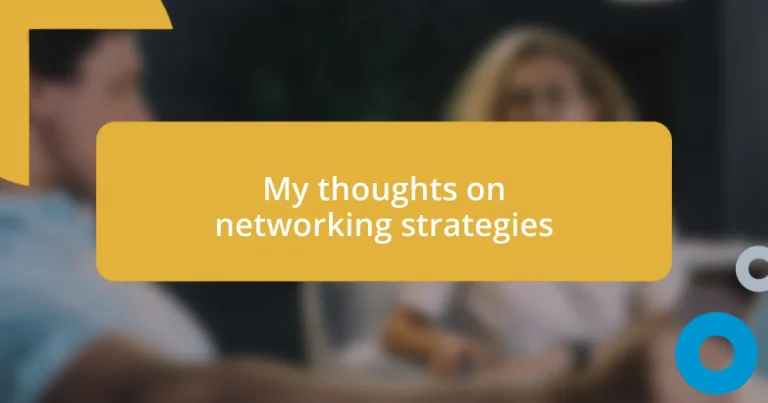Key takeaways:
- Networking is about quality over quantity; nurturing authentic relationships often leads to more significant opportunities and growth.
- Key principles of effective networking include authenticity, active listening, reciprocity, and consistent follow-up to build meaningful connections.
- Leveraging social media and maintaining professional connections through regular communication and support can significantly enhance networking success.
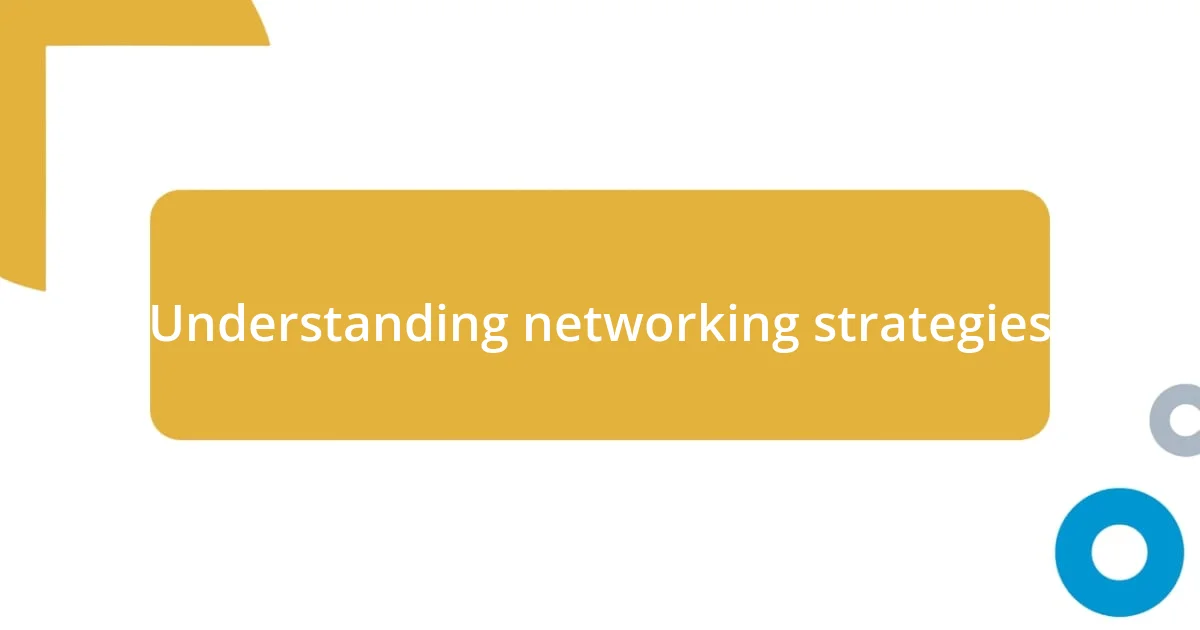
Understanding networking strategies
Networking strategies are often more than just exchanging business cards; they’re about building genuine connections. I still recall a conference where I struck up a conversation with a stranger over coffee. That simple interaction led to a collaboration that launched my career into a new direction. It really hit me how important authentic relationships are in this process.
Have you ever thought about why some people seem to effortlessly grow their network while others struggle? In my experience, it boils down to mindset and intention. I remember entering a networking event feeling nervous, but I shifted my approach by focusing on what I could learn from others rather than solely what I could gain. This shift not only eased my anxiety but also opened doors to meaningful conversations.
Strategizing your networking efforts involves recognizing that it’s not just about quantity, but quality. I often find myself revisiting connections from years ago who said something impactful. It reminds me that nurturing even a few strong relationships can be far more beneficial than having countless casual links. How often do you reach out to those you’ve connected with in the past? Every touchpoint can lead to new opportunities!
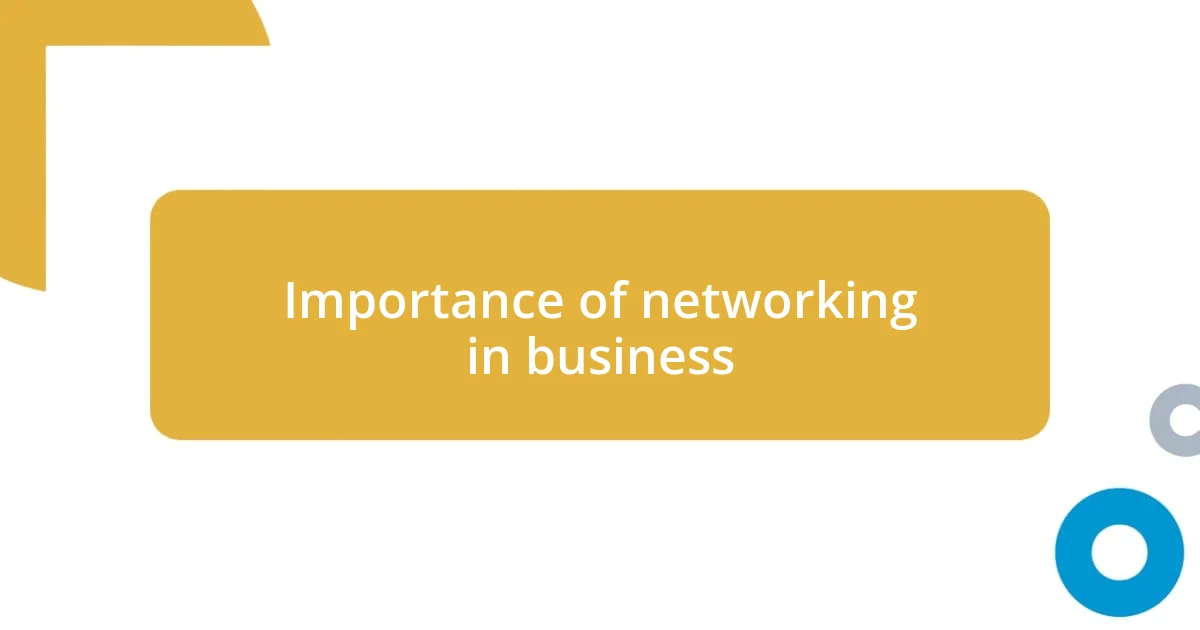
Importance of networking in business
Networking plays a crucial role in business success. I once attended a local meetup where I met a talented individual who later introduced me to a potential client. That moment demonstrated how pivotal a single connection can be in propelling one’s career or project forward. Every relationship built through networking can unlock new opportunities in ways we often don’t anticipate.
Moreover, the emotional aspect of networking cannot be overlooked. I remember feeling isolated in my early career until I reached out to others in my industry. Sharing experiences and challenges with like-minded professionals not only provided valuable insights but also lifted my spirits. It’s like gathering a support system that fosters growth and resilience in the often competitive business landscape.
The importance of building relationships extends beyond immediate gains. I’ve seen time and again how colleagues from past projects became valuable mentors down the line. Trust and reliability breed deeper partnerships, leading to collaborative efforts that can elevate our aspirations. This long-term vision reinforces that every interaction counts, shaping not just our present, but also our future in business endeavors.
| Benefits of Networking | Personal Experience |
|---|---|
| Opens new opportunities | Met a future client through a casual meetup. |
| Provides support and encouragement | Gained a reliable support system by connecting with peers. |
| Fosters long-term relationships | Worked with past colleagues who became mentors. |
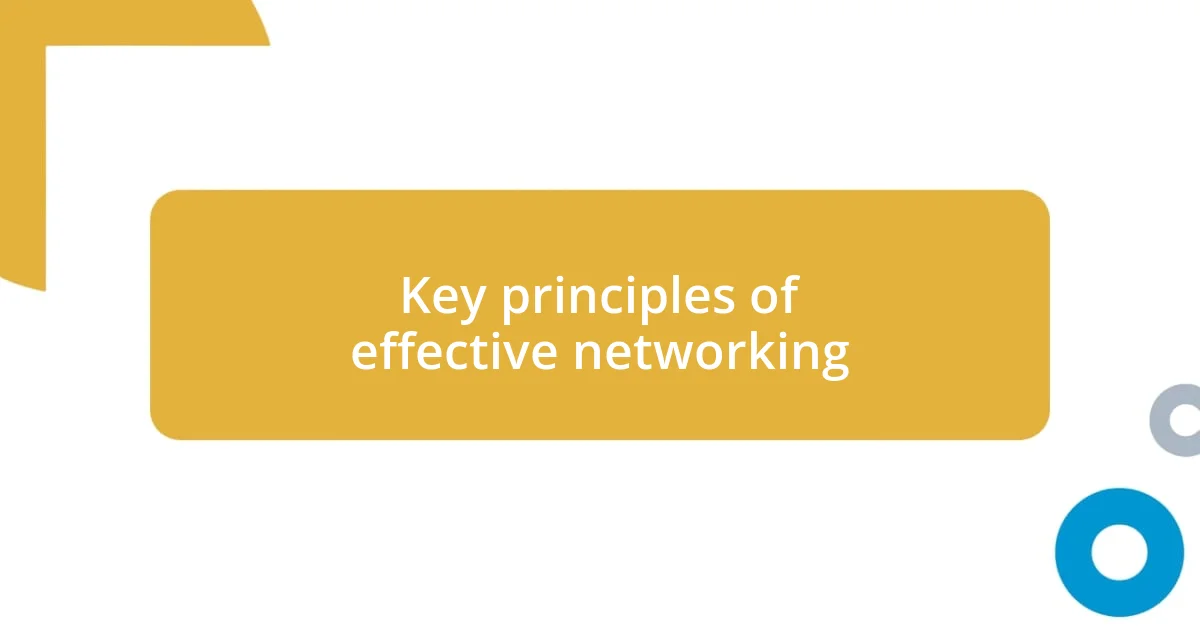
Key principles of effective networking
Building effective networking skills hinges on a few essential principles. One principle that has always resonated with me is the importance of active listening. I once attended a networking event where I made it a point to truly listen to others, rather than focusing on what I was going to say next. That simple adjustment unlocked deeper conversations and helped me form memorable connections. When people feel heard, they’re more likely to remember you and want to engage again.
Key Principles of Effective Networking:
- Authenticity: Be genuine in your interactions. People can sense when you’re being insincere.
- Active Listening: Show that you value what others are saying; it’s a powerful tool for connection.
- Follow-Up: After meeting someone, drop them a message. It reinforces the connection and keeps the door open for future interactions.
Another crucial principle is reciprocity. Networking should never feel one-sided. I recall a time when a colleague helped me prepare for an important presentation. Later, I was able to introduce her to a contact that advanced her career. In my eyes, this give-and-take is the heartbeat of effective networking, fostering trust and long-lasting relationships. It reminds us that just as we seek support, we should also be eager to offer it.
- Reciprocity: Look for ways to help others first; it strengthens bonds.
- Be Consistent: Regularly engage with your network. Consistency builds familiarity and trust.
- Stay Open-Minded: You never know where a conversation might lead. Keep your mind open to various possibilities.
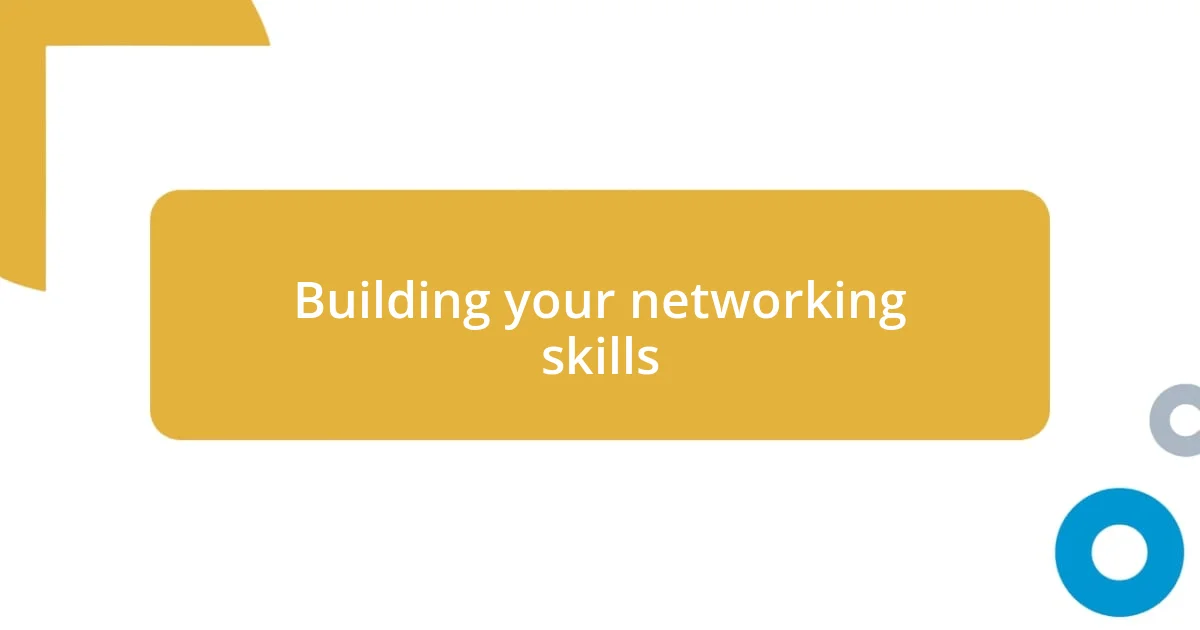
Building your networking skills
Developing networking skills is a subtle art that takes practice and dedication. I remember attending a conference years ago, feeling overwhelmed by the crowd. Instead of hiding in the back, I challenged myself to strike up a conversation with the first person I saw. That small leap of courage led to a rich discussion that not only sparked a new friendship but also a collaborative project. Have you ever considered how stepping out of your comfort zone can lead to unexpected relationships?
The practice of follow-up is another critical aspect of honing networking skills. I’ve learned that a simple message expressing appreciation for someone’s insights can make a lasting impression. After a panel discussion, I reached out to a speaker I admired, sharing how their talk resonated with me. That conversation turned into ongoing communication, opening doors I never anticipated. How many genuinely meaningful conversations have you let slide after the initial meeting?
Building your networking skills is about showcasing your authentic self. I once joined a small business group where everyone shared their struggles openly. I felt a wave of relief knowing I wasn’t alone in my challenges. By being transparent about my journey, I not only found support but also forged genuine connections that have continued to enrich my career. Have you thought about how vulnerability can be your greatest asset in networking?
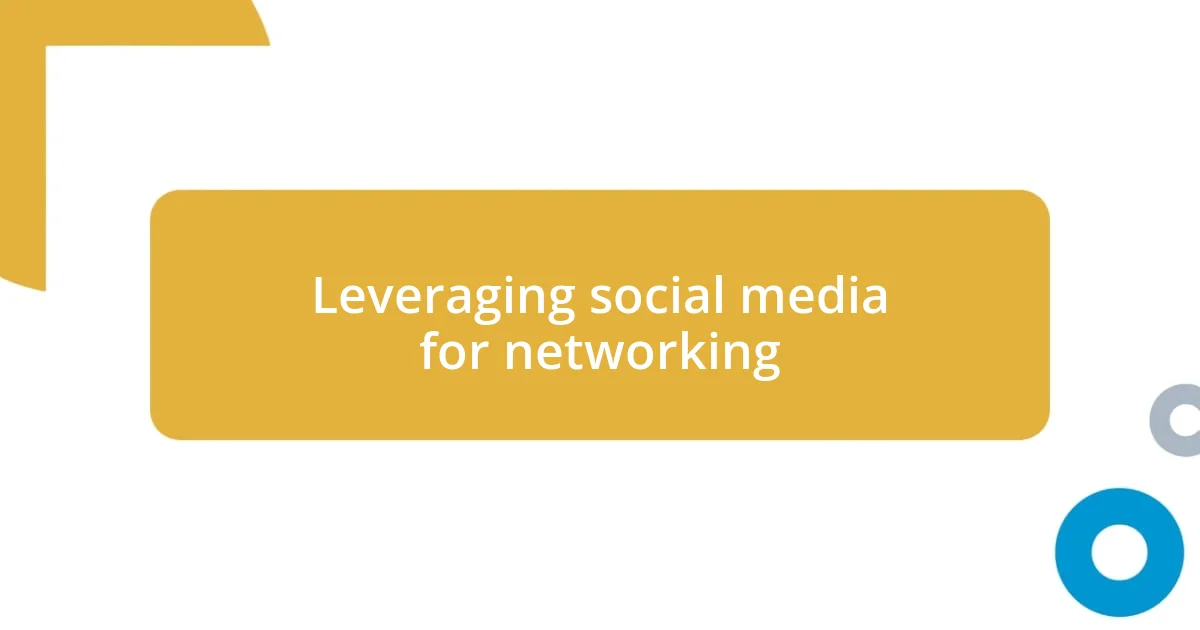
Leveraging social media for networking
I’ve found social media to be a game changer for networking. In my experience, platforms like LinkedIn or Twitter can serve as virtual business card exchanges. I remember attending a local meetup and immediately connecting with attendees through LinkedIn. It transformed fleeting encounters into lasting interactions, all with just a few clicks. Have you ever thought about how quickly you can establish rapport online?
Engaging with industry-specific content has a unique power too. After sharing an insightful article on LinkedIn, I was overwhelmed by the range of thoughtful responses from my connections. This not only deepened my relationships but opened up discussions that eventually led to collaborations. It’s fascinating how a simple post can merit dialogue—have you leveraged your expertise to inspire conversation?
Moreover, I strongly believe in the importance of joining virtual groups or forums. Participating in a Facebook group dedicated to my field introduced me to professionals I wouldn’t have met otherwise. I was inspired by someone’s story about overcoming a major career hurdle, which encouraged me to share my own. How often do you find that shared experiences can create unexpected bonds?
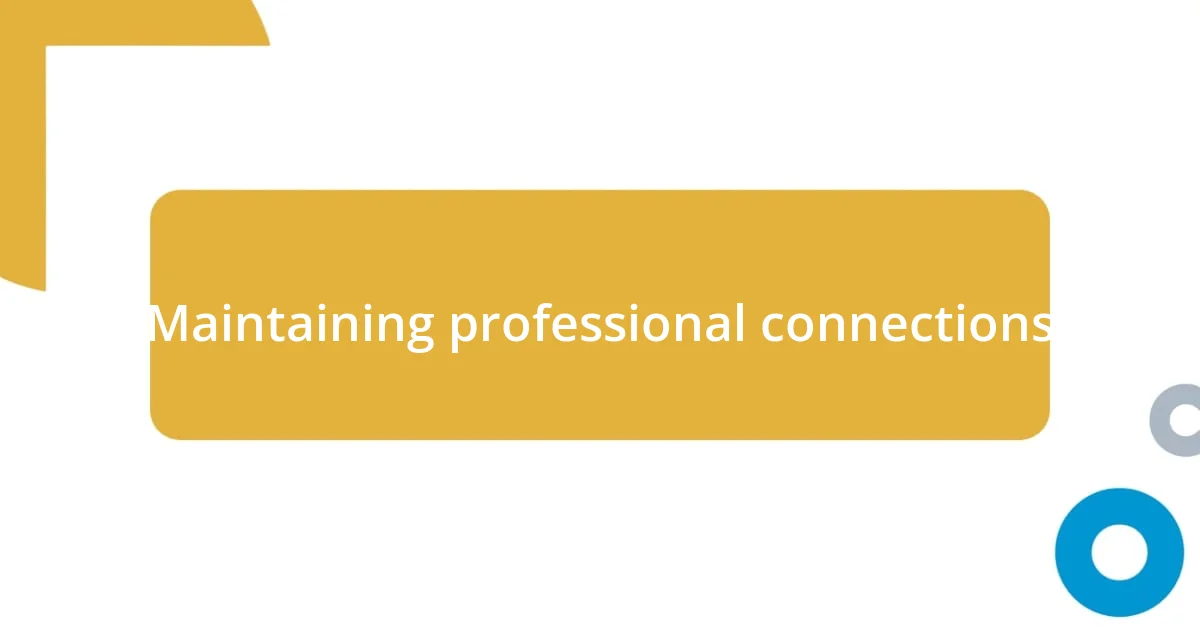
Maintaining professional connections
I believe maintaining professional connections is all about consistency. I once had a mentor who would send out a quick email check-in every few months, just to say hello and see how I was progressing. That simple gesture kept our relationship vibrant and grounded, even though we were both busy. Have you ever thought about how a little communication can go a long way in keeping the lines open?
I’ve also discovered that offering help can significantly strengthen those connections. There was a time when a former colleague reached out to me for advice on a project. I was happy to share my insight, and it was rewarding to see the impact my input had on their success. It’s fascinating how sharing your knowledge not only reinforces relationships but also fosters a sense of community—have you ever acted as a resource for others in your network?
Lastly, I’d say that recognizing milestones is a thoughtful way to nurture your professional ties. I recall congratulating a connection on their recent promotion with a personalized note. Their gratitude was palpable, and it sparked a deeper conversation about their new challenges. It’s moments like these that highlight how acknowledging achievements can foster loyalty and trust — how often do you celebrate the successes of your network?












